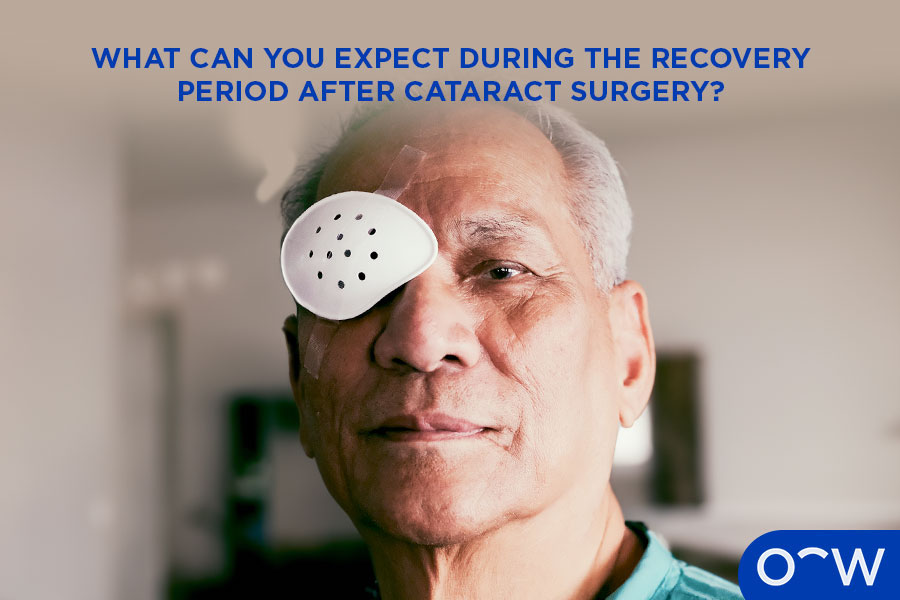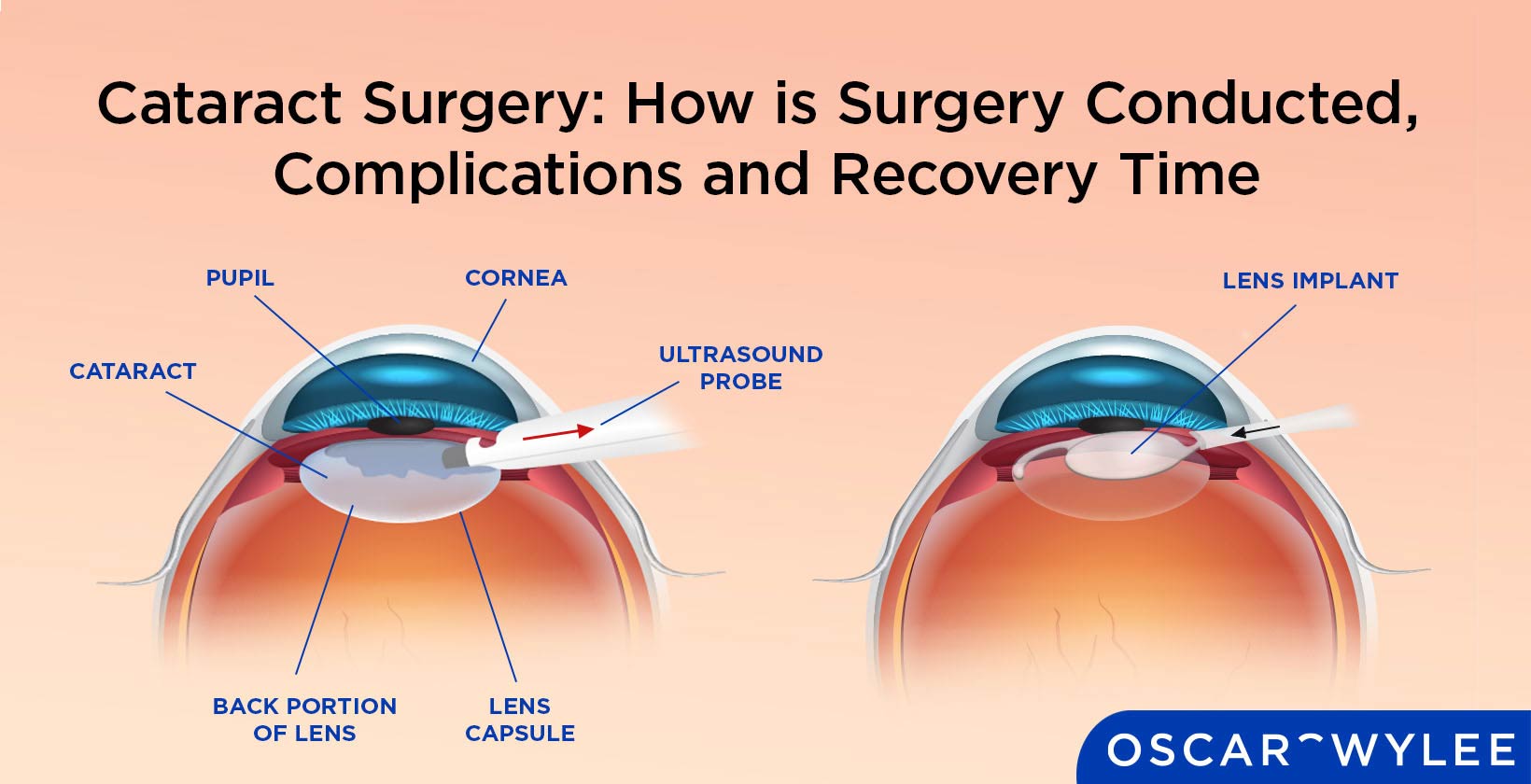Cataract Surgery: How is Surgery Conducted, Complications and Recovery Time
Published on April 16th, 2024
Updated on September 06th, 2024
Cataract surgery refers to a procedure to treat the eye condition cataracts, in which the affected lens is removed and replaced with an artificial lens or an intraocular lens (IOL). Cataracts is an eye condition in which proteins in the eye clump together and cloud the lens. Cataract surgery will be conducted by an ophthalmologist and generally takes around 45 minutes. An ophthalmologist is a medical doctor who specialises in eye care and is qualified to perform eye surgery. Cataract surgery recovery time may vary from person to person, but generally takes up to 8 weeks for the eye to benefit from the surgery.
What is Cataract Surgery?
Cataract surgery is a procedure in which the lens of an eye that has been affected by cataracts is replaced by a transparent artificial lens called an intraocular lens (IOL). Cataracts refers to an eye condition in which the lens of the eye becomes cloudy, which can affect vision. Cataracts are caused by damage to the proteins in the eye which then clump together. A cloudy lens affects how much light enters the eye which can impact vision, according to Health Direct. Cataract removal surgery aims to resolve this condition by replacing the lens and restoring vision. Cataract surgery will be conducted by an ophthalmologist, who in Australia, is a medical doctor that specialises in eye care.
How is Cataract Surgery Conducted?
Cataract surgery will be conducted by an ophthalmologist and is a simple procedure that usually takes around 45 minutes to perform. Cataract surgery is conducted by first numbing the eye with eye drops or an injection. The ophthalmologist will then make an incision in the eye, break down the lens, and insert the new lens. The patient will then have to wait in recovery to ensure nothing has gone wrong before they are sent home. The way cataract surgery is conducted is listed below.
- Numbing the eye: Numbing the eye is the first step in cataract surgery, so a patient will not feel any pain whilst the procedure is occurring. This can be done through numbing eye drops or injections.
- Ophthalmologist makes an incision in the eye: The ophthalmologist will then make an incision in the eye to access the lens.
- Breaking down the lens: Breaking down the lens is the next step in cataract surgery and will be done using small instruments, according to the American Academy of Ophthalmology.
- New artificial lens is inserted: The new artificial lens will be inserted into the eye.
- Patient will wait in recovery: The patient will have to wait in a recovery room for a period of time so the ophthalmologist can check if everything is okay with the eye. The patient will be sent home with a cover over the eye to protect the area while it heals.


How Long Does Cataract Surgery Typically Take?
Cataract surgery generally takes around 45 minutes to complete. Cataract surgery is a simple eye surgery that usually takes approximately 45 minutes, though this may differ depending on the person and their eye care professional.
What are the Cataract Surgery Complications?
Cataract surgery is generally a safe and straightforward procedure with minimal complications, however some may occur. Possible complications with cataract surgery include eye infection, blurred vision and retinal detachment. A patient needs to see a healthcare professional as soon as possible if they believe they are having complications following cataract surgery. The possible complications of cataract surgery are listed below.
- Eye infection: As cataract surgery is invasive, it comes with the risk of an eye infection. If a person notices the eye becoming red, painful, or leaking fluid, it is important to see a healthcare professional, according to Health Direct.
- Blurred vision: Blurred vision is a potential complication of cataract surgery, however, this is generally caused by swelling in the eye post operation, according to the American Academy of Ophthalmology, and should subside.
- Retinal detachment: Retinal detachment is a rare but serious complication of cataract or lens surgery, in which the retina detaches from the back of the eye. Symptoms of retinal detachment include a sudden increase of eye floaters, flashes and shadows over vision. If a person has symptoms of retinal detachment they should seek medical attention from a healthcare professional as soon as possible.
What is the Cataract Surgery Recovery Time?
The recovery time for cataract surgery will vary from person to person, but generally takes around 4 to 6 weeks, according to the NHS. After cataract surgery, the eye may feel uncomfortable and irritated and may water more. Most patients usually see improvements in vision 1-3 days post-surgery, according to My Health Alberta. However, it can take several weeks for the eye to fully heal and vision to benefit from the surgery.
Can Cataract Surgery Correct Vision Problems?
Yes, cataract surgery can correct vision problems that are related to the cataract itself. In some cases a surgeon may implant a lens that helps to reduce the need for glasses. You can get toric implants (to correct for astigmatism) or even multifocal implants.
How Do You Know When You Need Cataract Surgery?
An optometrist or ophthalmologist will discuss with a patient when cataract surgery is needed. If cataracts are in the early stages, surgery may not be necessary. However, if cataracts are affecting vision and making everyday activities hard, then cataract surgery may be recommended to replace the lens. You may have cataracts diagnosed by an optometrist, who is a primary eye care professional and the first point of contact in your eye health journey. An optometrist will diagnose cataracts through an eye test, and monitor the progression of the condition. If your optometrist believes a cataract needs treatment, they will refer you to an ophthalmologist who will conduct the surgery. At Oscar Wylee, eye tests are bulk billed for eligible Medicare card holders. If your optometrist believes a cataract needs treatment, they will refer you to an ophthalmologist who will conduct the surgery.


What Can You Expect During the Recovery Period After Cataract Surgery?
The recovery period after cataract surgery will take several weeks and is generally an easy recovery process. According to the NHS, a person will generally be able to go home on the same day of the surgery, with vision returning in a few hours. After cataract surgery has been completed, the patient will have an eye patch or a pad put over the eye to help protect it. During the first few days of recovery, the eye may feel irritated or uncomfortable and may water more than usual. Vision should return to normal in a few days. During the recovery process, it is important to look after the eye, use eye drops if they have been provided and avoid strenuous activity. Full healing may take several weeks. If there is pain, redness or discharge from the eye, it is important to seek medical attention.


What Preparations Are Necessary Before Undergoing Cataract Surgery?
The preparations a person should take before undergoing cataract surgery will be at the discretion of the ophthalmologist performing the eye surgery. According to Health Direct, the preparation before surgery may include eye drops or an injection around the eye to numb the area. It's also important to prepare transportation to and from the appointment as you will be unable to drive yourself after surgery.
Is Cataract Surgery a Permanent Solution for Cataracts?
Yes, cataract surgery is conducted to be a permanent solution for cataracts. Cataract surgery involves removing the affected lens and replacing it with an intraocular lens (IOL). According to Better Health Victoria, a cataract cannot redevelop after it has been removed.
How is the Eye Affected After Cataract Surgery?
After cataract surgery, the eye may be affected by postoperative symptoms such as blurry eyes, a feeling of irritation, gritty eyes or the feeling that something is in the eye. These post-operative symptoms should clear up within 1-3 days. As the eye heals, vision should improve. When the eye is fully healed, the symptoms of cataracts such as cloudy and blurred vision, should be gone.



